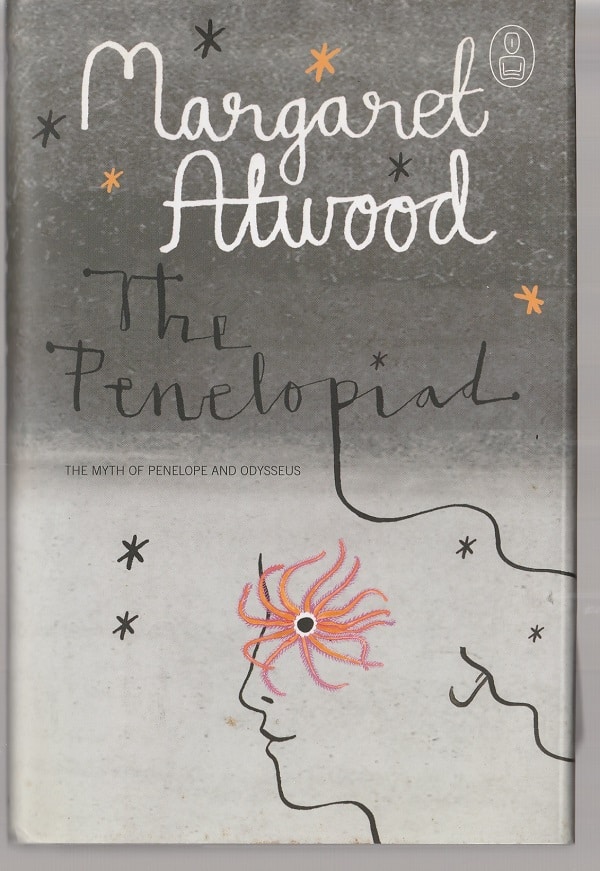In The Penelopiad, her 2005 revisualization of The Odyssey from the point of view of Penelope, Margaret Atwood uses the queen of Ithaca’s twelve maids as a Greek chorus to comment on the action — including their own brutal execution by hanging.
Penelope has been known through the centuries as the epitome of the faithful wife for waiting twenty years for the return of Odysseus, but, in the context of modern-day feminism, that seems a narrow-minded, restrictive pigeon-hole in which to put her. Hence, Atwood’s novel.
The twelve maids are the young slave women who became the sexual partners of the bullying, oppressive, arrogant dandies, gathered at Odysseus’s home to seek the hand of Penelope.
These imperious young bucks been eating her out of house and home while laying siege to her as a marriage prize once, as they expect, she finally sees reason and recognizes that her husband will never come back from Troy. After all, he was on the battlefield for ten years, and now it’s another ten years on with no word from him regarding his whereabouts or homecoming.
Atwood envisions as many as one-hundred-and-twenty of these suitors, all of whom are slain at the end of The Odyssey by Odysseus, his twenty-one-year-old son Telemachus and two helpers.
That carnage is followed by Odysseus’s order to Telemachus to kill the twelve maids for betraying their role and status as house slaves by going to bed with the suitors. They are hanged, all in a line. In their first appearance as the chorus, they sing:
we danced in the air
our bare feet twitched
it was not fair
“Spawned, merely, lambed, farrowed, littered”

Atwood imagines these twelve women as young as Telemachus. Indeed, as his childhood playmates — but not his equals, as the chorus makes clear when singing of Telemachus’s birth. They sing of him sailing
The wine-red seas of his mother’s blood…
In his frail dark boat, the boat of himself,
Through the dangerous ocean of his vast mother he sailed.
The maids made a similar, though very different, journey as well:
And we, the twelve who were later to die by his hand
At his father’s relentless command,
Sailed as well, in the dark frail boats of ourselves
Through the turbulent seas of our swollen and sore-footed mothers
Who were not royal queens, but a motley and piebald collection,
Bought, traded, captured, kidnapped from serfs and strangers.
They tell how the birth of Telemachus was longed for, but theirs not. Penelope presented a princeling.
Our various mothers
Spawned, merely, lambed, farrowed, littered,
Foaled, whelped and kittened, brooded, hatched out of their clutch.
We were animal young, to be disposed of at will.
They tell that Telemachus was fathered.
We simply appeared.
Have it both ways
The maids are the characters I remember best after this my second reading of The Penelopiad. (My review from my first reading is here.)
Of course, this is a book about Penelope, and Atwood suggests much about her that’s missing from The Odyssey — that she was clever enough to keep the home fires burning while Odysseus was away at war and at wandering, and to keep the suitors at bay over many years, and to keep self-contained and impregnable, and to keep faithful.
But maybe not.
Atwood has Penelope deny rumors that she played around while her husband was away (and, at times, playing footsie with goddesses). But she also has the twelve maids sing of helping Penelope to commit and hide many infidelities.
In this manner, Atwood can have it both ways — Penelope remaining faithful (as tradition has it) and Penelope finding a way to obtain sexual release and pleasure (as modern sexuality has as the ideal).
An oversight
And what was it like for Telemachus to have Penelope as a mother?
She is portrayed as a doting mother who over-dotes. She continually refers to her son as a teenager when he is at least 21, since he was an infant when his father went off to Troy.
And as the supervisor (well, owner) of the twelve maids?
Penelope sees herself, in the way of an aristocrat, as being one of the girls with the twelve maids. And she uses them to spy on the suitors, encouraging them to bed the men to learn their plans and secrets.
So the twelve maids aren’t sleeping with the suitors because of randiness or out of betrayal, but on orders from their mistress. Something, Odysseus and Telemachus don’t know.
In fact, Penelope does nothing to alert her husband and son to her alliance with the twelve maids acting as under-the-covers agents for her. She does nothing to stop the hanging of the twelve maids.
She describes her failure as an oversight.
Forever twitching
In The Penelopiad, Penelope is a more complex figure than in The Odyssey. Atwood suggests that she may even be a kind of a moon goddess with the twelve maids as her acolytes.
Still, the twelve maids were much more interesting for me than their mistress. Maybe it’s the proletariat in me.
Penelope has a difficult time maneuvering through her life because she is a woman. But she’s a rich and powerful woman.
Those twelve maids are women, poor and powerless. They pay the price of their powerlessness in both The Odyssey and The Penelopiad.
Penelope lives on, abandoned again by her footloose husband.
The twelve maids dangle from their nooses, their feet forever twitching.
.
Patrick T. Reardon
11.10.22
Written by : Patrick T. Reardon
For more than three decades Patrick T. Reardon was an urban affairs writer, a feature writer, a columnist, and an editor for the Chicago Tribune. In 2000 he was one of a team of 50 staff members who won a Pulitzer Prize for explanatory reporting. Now a freelance writer and poet, he has contributed chapters to several books and is the author of Faith Stripped to Its Essence. His website is https://patricktreardon.com/.
